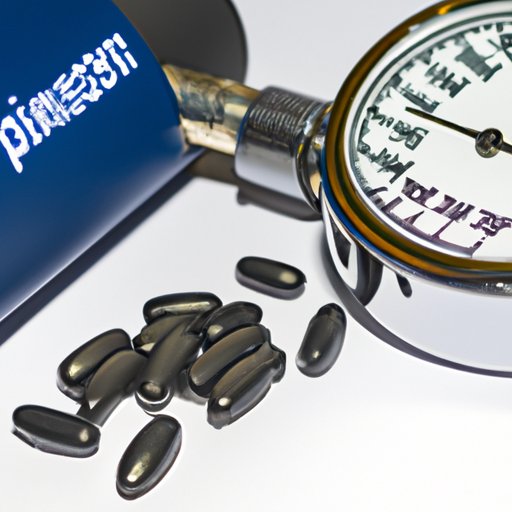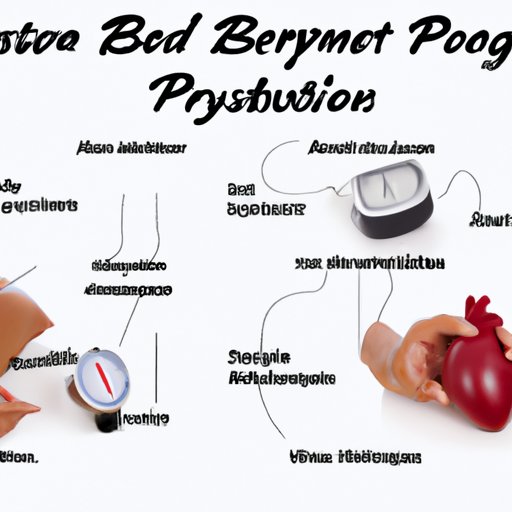Introduction
Blood pressure is a measure of the force of blood pushing against the walls of your arteries as it moves through your body. It is important to maintain healthy levels of blood pressure as it can have an impact on your overall health and wellbeing. If left unchecked, high blood pressure can increase the risk of developing serious conditions such as stroke, heart attack, and even kidney disease. To help manage and control high blood pressure, doctors often prescribe blood pressure medication.

Exploring the Mechanisms of Blood Pressure Medication
So, how does blood pressure medicine work? In order to understand the mechanisms behind blood pressure medication, it is important to first look at the different types available. Generally speaking, there are four main types of blood pressure medications: beta-blockers, calcium channel blockers, angiotensin-converting enzyme (ACE) inhibitors, and angiotensin II receptor blockers (ARBs). Each type works differently to lower blood pressure, but they all act on the same pathways to achieve the desired effect.

Investigating the Science Behind Blood Pressure Drugs
To better understand how blood pressure medicine works, it is necessary to examine the chemical and biological reactions that occur when these drugs are taken. Beta-blockers, for instance, work by blocking the action of certain hormones in the body that can cause the blood vessels to constrict. This helps to reduce the amount of pressure in the arteries, leading to lower blood pressure. Calcium channel blockers, on the other hand, work by reducing the amount of calcium in the cells lining the arteries, which helps to relax the muscles in the walls of the arteries and improve blood flow.
ACE inhibitors work by inhibiting the production of angiotensin II, a hormone that can cause the blood vessels to narrow. This helps to reduce the amount of pressure in the arteries and lower blood pressure. ARBs, meanwhile, work by blocking the action of angiotensin II, which helps to relax the muscles in the artery walls and improve blood flow.

Uncovering How Blood Pressure Medication Works
In order to understand how blood pressure medicine works, it is important to look at the basic process of blood pressure regulation. When the body senses a change in blood pressure, it responds by releasing hormones that cause the blood vessels to constrict or relax. If the blood vessels constrict, the amount of pressure in the arteries increases; if the blood vessels relax, the amount of pressure decreases.
Blood pressure medications work by acting on these hormones, either blocking their action or inhibiting their production. By doing so, they help to reduce the amount of pressure in the arteries and improve blood flow throughout the body. This helps to lower blood pressure to a healthy level, reducing the risk of developing serious conditions associated with hypertension.
Examining the Different Types of Blood Pressure Medicine
As mentioned, there are four main types of blood pressure medications: beta-blockers, calcium channel blockers, ACE inhibitors, and ARBs. Each type works differently but they all act on the same pathways to achieve the desired effect. Here is a brief overview of each type:
- Beta-Blockers: These medications work by blocking the action of certain hormones in the body that can cause the blood vessels to constrict. This helps to reduce the amount of pressure in the arteries, leading to lower blood pressure.
- Calcium Channel Blockers: These medications work by reducing the amount of calcium in the cells lining the arteries, which helps to relax the muscles in the walls of the arteries and improve blood flow.
- ACE Inhibitors: These medications work by inhibiting the production of angiotensin II, a hormone that can cause the blood vessels to narrow. This helps to reduce the amount of pressure in the arteries and lower blood pressure.
- ARBs: These medications work by blocking the action of angiotensin II, which helps to relax the muscles in the artery walls and improve blood flow.

Understanding the Side Effects of Blood Pressure Medication
As with any medication, there are possible side effects associated with blood pressure medication. Common side effects include headaches, dizziness, nausea, and fatigue. In rare cases, more serious side effects such as liver damage, low blood pressure, and irregular heartbeat may occur. It is important to speak to your doctor if you experience any of these symptoms while taking blood pressure medication.
Analyzing the Benefits of Taking Blood Pressure Medicine
Despite the potential side effects, there are many benefits to taking blood pressure medication. Studies have shown that taking these medications can significantly reduce the risk of developing serious cardiovascular diseases such as heart attack and stroke. Additionally, taking blood pressure medication can help improve blood flow and circulation throughout the body, which can have a positive impact on overall health and wellbeing.
“High blood pressure is a major risk factor for cardiovascular disease, and lowering it can significantly reduce the risk of having a heart attack or stroke,” says Dr. Peter Wilcox, a cardiologist at the University of California, San Francisco. “By taking blood pressure medication, patients can reduce their risk of developing these serious conditions.”
Assessing How Blood Pressure Medicine Can Help Manage Hypertension
Hypertension, or high blood pressure, is a major risk factor for developing serious cardiovascular diseases. Taking blood pressure medication can help lower blood pressure to a healthy level, reducing the risk of developing these conditions. Additionally, taking these medications can also help to reduce the risk of having a heart attack or stroke.
“Taking blood pressure medication can be an effective way to manage hypertension and reduce the risk of developing serious cardiovascular diseases,” says Dr. Wilcox. “It’s important to discuss the risks and benefits of taking these medications with your doctor before starting any treatment plan.”
Conclusion
Blood pressure medication can be an effective way to manage hypertension and reduce the risk of developing serious cardiovascular diseases. It is important to understand how these medications work and the potential side effects they can cause. However, the benefits of taking these medications far outweigh the risks, and they can be a valuable tool in helping to regulate blood pressure and improve overall health and wellbeing.
(Note: Is this article not meeting your expectations? Do you have knowledge or insights to share? Unlock new opportunities and expand your reach by joining our authors team. Click Registration to join us and share your expertise with our readers.)
